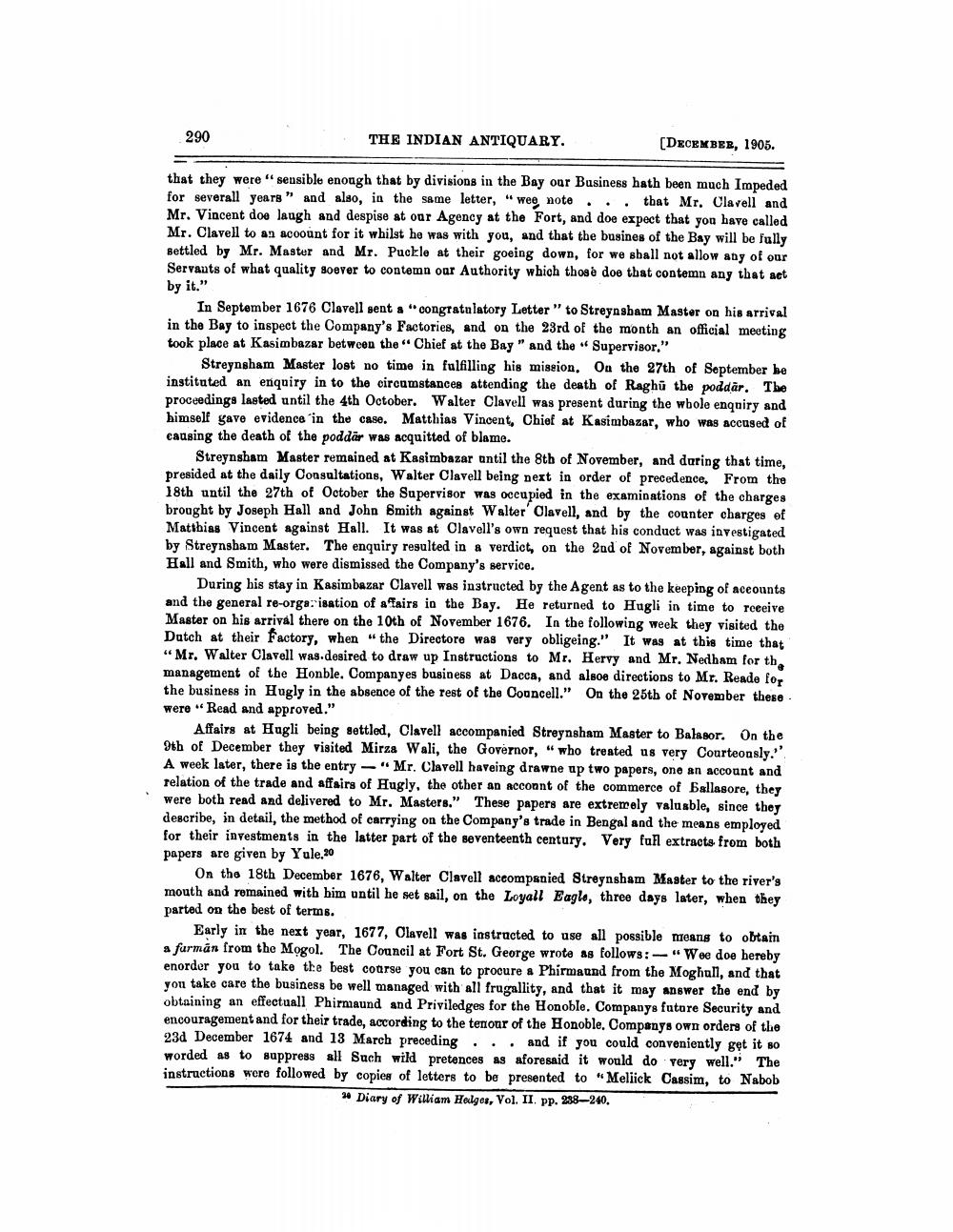________________
290
THE INDIAN ANTIQUARY.
[DECEMBER, 1905.
that they were "sensible enough that by divisions in the Bay our Business hath been much Impeded for severall years" and also, in the same letter, "wee note ... that Mr. Clavell and Mr. Vincent doe laugh and despise at our Agency at the Fort, and doe expect that you have called Mr. Clavell to an account for it whilst he was with you, and that the busines of the Bay will be fully Bettled by Mr. Master and Mr. Puckle at their goeing down, for we shall not allow any of our Servants of what quality soever to contemn our Authority which those doe that contemn any that act by it."
In September 1676 Clavell sent a "congratulatory Letter" to Streynsbam Master on his arrival in the Bay to inspect the Company's Factories, and on the 23rd of the month an official meeting took place at Kasimbazar between the Chief at the Bay " and the Supervisor."
Streynsham Master lost no time in fulfilling his mission. On the 27th of September be instituted an enquiry in to the circumstances attending the death of Raghu the poddar. The proceedings lasted until the 4th October. Walter Clavell was present during the wbole enquiry and himself gave evidence in the case. Matthias Vincent, Chief at Kasimbazar, who was accused of causing the death of the poddār was acquitted of blame.
Streynsham Master remained at Kasimbazar until the 8th of November, and during that time, presided at the daily Consultations, Walter Clavell being next in order of precedence, From the 18th until the 27th of October the Supervisor was occupied in the examinations of the charges brought by Joseph Hall and John Smith against Walter Clavell, and by the counter charges of Matthias Vincent against Hall. It was at Clavell's own request that his conduct was investigated by Streynsham Master. The enquiry resulted in a verdict, on the 2nd of November, against both Hall and Smith, who were dismissed the Company's service.
During his stay in Kasimbazar Clavell was instructed by the Agent as to the keeping of aceounts and the general re-orgarisation of affairs in the Bay. He returned to Hugli in time to receive Master on his arrival there on the 10th of November 1676. In the following week they visited the Dutch at their factory, when the Directore was very obligeing." It was at this time that “Mr. Walter Clavell was.desired to draw up Instractions to Mr. Hervy and Mr. Nedham for the management of the Honble. Companyes business at Dacca, and alsoe directions to Mr. Reade for the business in Hugly in the absence of the rest of the Cooncell." On the 25th of November these were "Read and approved."
Affairs at Hugli being settled, Clavell accompanied Streynsham Master to Balasor. On the 9th of December they visited Mirza Wali, the Governor, " who treated us very Courteously.' A week later, there is the entry "Mr. Clavell haveing drawne up two papers, one an account and relation of the trade and affairs of Hugly, the other an acconnt of the commerce of Ballasore, they were both read and delivered to Mr. Masters." These papers are extremely valuable, since they describe, in detail, the method of carrying on the Company's trade in Bengal and the means employed for their investments in the latter part of the seventeenth century. Very fun extracts from both papers are given by Yule 20
On the 18th December 1676, Walter Clavell accompanied Streynsham Master to the river's mouth and romained with him until he set sail, on the Loyall Eaglo, three days later, when they parted on the best of terms.
Early in the next year, 1677, Clavell was instructed to use all possible means to obtain a furman from the Mogol. The Council at Fort St. George wrote as follows: "Wee doe hereby enorder you to take the best course you can tc procure a Phirmaund from the Moghall, and that you take care the business be well managed with all frugallity, and that it may answer the end by obtaining an effectuall Phirmaund and Priviledges for the Honoble. Companys fatore Security and encouragement and for their trade, according to the tenour of the Honoble, Companys own orders of the 230 December 1674 and 13 March preceding ..and if you could conveniently get it so worded as to suppress all Such wild pretences as aforesaid it would do very well." The instructions were followed by copies of letters to be presented to "Meliick Cassim, to Nabob
* Diary of William Helges, Vol. II, pp. 288–240.




